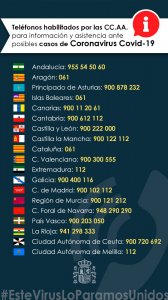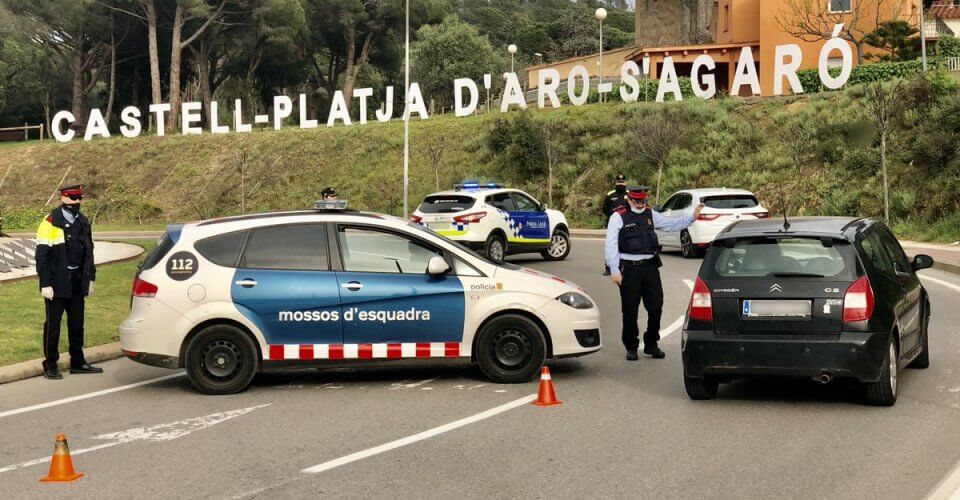Official figures released by the Spanish Health Ministry at 12 noon on Monday 23 March now confirm 33,089 known cases of Coronavirus (Covid-19) in Spain, which is 4,517 more than yesterday. 2,182 people are now also known to have died from the pandemic in Spain (up by 462 from yesterday). There are 18,374 people in hospital of which 2,355 are in intensive care. 3,355 people have now made a full recovery.
Based on nearly 40% of Coronavirus fatalities in Spain, 87% were aged over 70, and 7.8% between the age of 60 and 69. There has not been a single death among children under 10 and only one between the ages of 0 and 19.
Of the official figures announced, 10,575 confirmed cases are known to be in the Madrid region, and where 1,263 have died (from the total 2,182 across the country). There are now 5,925 cases in Catalonia, 2,421 in the Basque Country, 1,961 in Andalusia, 2,078 in Castilla La Mancha and 1,901 in Valencia.
Figures for other regions are as follows: Aragón 638, Asturias 594, Balearic Islands 400, Canary Islands 481, Cantabria 347, Castilla y León 2,055, Extremadura 493, Galicia 1,208, Melilla 28, Murcia 345, Navarra 886 and La Rioja 747. Click here for further details of the statistics for 23 March from Spain’s Health Ministry.
Across the globe, emergency efforts to try and slow the Coronavirus pandemic have increased on Monday, with more nations and cities imposing lockdowns, as the death toll spirals towards 15,000 worldwide.
CORONAVIRUS in SPAIN NEWS
Spanish Prime Minister Pedro Sánchez has confirmed that the current lockdown in Spain due to the Coronavirus (Covid-19) pandemic will be extended until at least 11 April. The measure must first be approved by the Spanish Congress.
On Sunday Sánchez expressed his conviction that all parliamentary groups would support the extension. ‘This is a drastic measure, one of the most drastic adopted by our peer countries,’ he said. ‘I am aware that this is very inconvenient for the people of Spain and that it hits family life, but the experts agree that it is effective in the fight against the Coronavirus.’
On Monday morning Carmen Calvo, 62, Spain’s first deputy prime minister, was admitted to hospital with ‘respiratory problems’. Latest reports stated that Calvo was being tested for Coronavirus and awaiting the results.
Spain has also now extended its land border travel restrictions to include the country’s airports and ports for the next 30 days. Only Spanish nationals, official residents of Spain, or residents of the EU and countries associated within the Schengen zone who can prove that they are returning to the place of residence in Spain, will be permitted entry.
The order will not apply at Spain’s borders with Andorra or Gibraltar, but it does include the temporary closure of the crossings at Spain’s North African exclave cities of Ceuta and Melilla.
ALSO READ: The new restrictions at Spain’s airports, ports and land borders
Around 3,910 healthcare workers in Spain have tested positive for Coronavirus, according to Fernando Simón, the director of the Health Ministry’s Coordination Centre for Health Alerts. An estimated 600 health workers in Madrid alone have tested positive.

Officials in Spain warn that the number of deaths and infections will continue to rise this week and that the worst is yet to come.
ALSO READ: Madrid starts receiving patients at IFEMA exhibition centre ‘hospital’
‘We have yet to see the impact of the strongest, most damaging wave, which will test our material and moral capacities to the limit, as well as our spirit as a society,’ prime minister Sánchez said on Sunday.
He said that his government was also undertaking five new actions to help the fight against Coronavirus:
Firstly, the government would make available to the regional governments of Spain all of the installations and material and human resources of private homes for the elderly. The goal, Sánchez said, was to alleviate the saturation of these centres and improve living conditions for the elderly, as well as to reduce their level of risk of infection.
Secondly, all non-essential travel from third countries will be restricted for 30 days (as reported above).
Thirdly, Spain’s armed forces would start to increase their activity in three areas: the transfer of the sick from saturated hospital centres to nearby centres with healthcare resources available; the security of critical infrastructures; and logistical support in areas such as the distribution of healthcare material and staff.
Fourthly, the Spanish government would be facilitating resources to local authorities for the home delivery of food and basic products, as well as pharmaceutical products, with the aim of ensuring that the elderly do not need to leave home.
Lastly, Sánchez said that his government had also decided to establish a ‘strategic reserve of products’ to fight any potential future pandemics.
ALSO READ: Coronavirus in Spain – full advice for British travellers seeking to return to the UK

In CATALONIA, the authorities on Monday have introduced a ‘certificate of self-responsibility’ document that can be downloaded and filled out online.
The document is similar to one already used in France and intends to facilitate the job of the Catalan police (the Mossos d’Esquadra) trying to enforce the lockdown.
ALSO READ: Walking a goat or a Vietnamese pig is not allowed
With people only allowed to leave home for work, to buy food, or seek medical assistance, going out without a good reason can lead to fines of between 100 and 600,000 euros.
The document is not compulsory and further details can be found here: government’s online FAQ about the document.
Spain’s Ministry of Defence has posted a short video of a week fighting against Coronavirus:
Una semana luchando todos juntos sin descanso las 24 horas de cada día contra el #COVID19 #EsteVirusLoParamosUnidos pic.twitter.com/9N8AAgyzDn
— Ministerio Defensa (@Defensagob) March 22, 2020
SPANISH POLITICAL FIGURES WHO HAVE TESTED POSITIVE FOR CORONAVIRUS
A number of political figures across Spain have tested positive for Coronavirus, or have gone into quarantine and are awaiting results of tests. The first politician to test positive was Javier Ortega Smith, secretary general of the far-right Vox party. The news followed closely after the party had held a mass rally at the Vistalegre arena in Madrid on Sunday 8 March, attended by around 9,000 Vox supporters. On the same day mass rallies were held across Spain, particularly in Madrid and Barcelona, to celebrate International Women’s Day.
Soon after the news that Ortega Smith had contracted Coronavirus, the leader of the Vox party, Santiago Abascal, also tested positive, as well as the Vox MP Macarena Olona.
Irene Montero, Spain’s Equality Minister and partner of the second deputy prime minister and leader of the Podemos party, Pablo Iglesias, also tested positive for Coronavirus. The president of the Catalan government, Quim Torra, has also tested positive.
Isabel Díaz Ayuso, leader of Madrid’s regional government, tested positive last week. Begoña Gómez, wife of Spanish prime minister Pedro Sánchez, has also tested positive.
Ana Pastor, a politician of the right-wing People’s Party (PP), a former Minister of Health and currently the second deputy speaker of the Spanish Congress, tweeted this morning that she has now been given the all clear of Coronavirus, having tested positive on 11 March.
Quiero compartir con todos vosotros una buena noticia: me han hecho la PCR después de 15 días y el resultado es negativo. Quiero agradecer a los profesionales sanitarios su gran esfuerzo y dedicación y trasladar a todos los ciudadanos un mensaje de esperanza.
— Ana Pastor Julián (@anapastorjulian) March 23, 2020
CORONAVIRUS ACROSS THE GLOBE:
In addition to Spain extending its lockdown until at least 11 April, Germany has banned gatherings of more than two people, New Zealand has also announced a 4-week lockdown, and Hong Kong has shut its borders to all non-residents. The UK could also impose a lockdown if people continue to ignore the advice of the government.
Italy now has the world’s worst death toll from the pandemic, approaching 5,500 in total with another 651 deaths reported just on Sunday, after it surpassed China with the highest number of fatalities. Greece on Monday also followed Italy, Spain and France in imposing a nationwide lockdown.
In Germany, Chancellor Angela Merkel announced the ban on gatherings of more than two people on Sunday whilst she was in quarantine herself, after having met with an infected doctor.
The Tokyo Olympics scheduled for July now also looks increasingly likely to be postponed, with Canada and Australia announcing that they would not send athletes to Japan, and that they are seeking a one-year delay.
In the US, President Donald Trump has ordered thousands of emergency hospital beds to be set up at Coronavirus hotspots. ‘We’re at war, in a true sense we’re at war,’ Trump said.
It was reported on Sunday that recently convicted rapist Harvey Weinstein has tested positive for Coronavirus and is currently in confinement at a New York prison, where he is serving 23 years. In Spain, opera star Placido Domingo has also tested positive for Coronavirus.
Below are the numbers to call for each region of Spain for information and assistance in the event of possible cases of Coronavirus – as issued by the Spanish health authorities.

Up-to-date WHO advice and facts (in English) about the Coronavirus epidemic can be found here: www.who.int/emergencies/diseases/novel-coronavirus-2019/technical-guidance.
Our previous reports on Coronavirus in Spain:
ALSO READ: Madrid starts receiving patients at IFEMA exhibition centre ‘hospital’
ALSO READ: Confirmed: lockdown extended until at least 11 April
ALSO READ: Coronavirus in Spain full update (22 March)
ALSO READ: Walking a goat or a Vietnamese pig is not allowed
ALSO READ: Coronavirus in Spain full update (21 March)
ALSO READ: Coronavirus in Spain full update (20 March)
ALSO READ: ‘This virus we will stop together’ – video
ALSO READ: Coronavirus in Spain full update (19 March)
ALSO READ: Despite lockdown, Spaniards applaud health workers from balconies every evening
ALSO READ: Coronavirus in Spain – full update (18 March)
ALSO READ: UEFA Euro 2020 postponed as Coronavirus hits global sport
ALSO READ: Coronavirus in Spain – full update (16 March)
ALSO READ: Spain to close its land borders
ALSO READ: Coronavirus in Spain update (15 March)
ALSO READ: Spain officially in lockdown from midnight (14 March)
ALSO READ: Coronavirus in Spain update – Spain ‘state of alarm’, Catalonia ‘lockdown’ (13 March)
ALSO READ: Coronavirus in Spain update – 4 Catalan towns in lockdown (12 March)
ALSO READ: Coronavirus in Spain update – 11 March
ALSO READ: Coronavirus in Spain update – 10 March
ALSO READ: Coronavirus in Spain update – 8 March
ALSO READ: Over 70 cases of Coronavirus in Spain, as WHO also raises risk alert
ALSO READ: Coronavirus confirmed in Tenerife and Catalonia – via Italy
ALSO READ: Two deaths from Coronavirus in northern Italy, as region faces lockdown
ALSO READ: Mobile World Congress cancelled due to Coronavirus fears
ALSO READ: Ericsson, Nvidia follow LG, pulling out of Mobile World Congress over Coronavirus fears
Editor’s note:
At Spain in English we’re always keen to also publish positive stories and features about life in Spain – not just the current news. With all cultural and sporting events currently on hold, as well as travel and gastronomic excursions, we welcome on-going contributions from all of you who’d like to send us articles for publication. Although we are unable to currently pay for contributions, we will certainly credit you and share the articles across our social media network (if of interest) – and/or also link to your own blogs or other sites. We currently welcome upbeat, positive and fun articles – perhaps how you’re coping with the ‘lockdown’ in your own area of Spain – or how your community is responding, or recommendations of help to others. We have a dedicated ‘Opinion, Blogs & Spanish Experiences‘ section where your articles will appear. We will edit for clarity and length only – and we reserve the right to not publish. Articles should be sent via email to editorial@spainenglish.com (preferably with a photo and credit details), and should be around 500 words (800 to 1,000 max). We will try to respond to everyone, but please be patient with us. We’re a very small team but with big ambitions! Please stay safe. Thank you for reading and following us.


